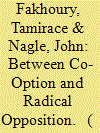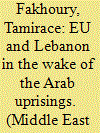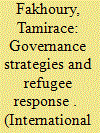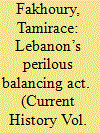|
|
|
Sort Order |
|
|
|
Items / Page
|
|
|
|
|
|
|
| Srl | Item |
| 1 |
ID:
158290


|
|
|
|
|
| Summary/Abstract |
This article provides a comparative analysis of two types of power-sharing: Lebanon's corporate version and Northern Ireland's relatively liberal arrangements. Our aim is to explore whether these power-sharing institutions augment or stymie gender and LGBTQ equality, while also illuminating the complex ways in which LGBTQ movements conceptualize power-sharing. We argue that while Northern Ireland's liberal arrangements, predicated on a minority rights regime, theoretically offer opportunities for gender and LGBTQ mobilization and equality, these rights claims are frustrated as they become embroiled in the wider ethnonational conflict for group rights. In Lebanon's corporate system, alternatively, where gender and LGBTQ rights are absent, feminist and LGBTQ movements identify power-sharing as institutionalizing patriarchy and homophobia and thus engage in a radical campaign of opposition to consociationalism.
|
|
|
|
|
|
|
|
|
|
|
|
|
|
|
|
| 2 |
ID:
134683


|
|
|
|
|
| Summary/Abstract |
This article examines Lebanon’s political dynamics in the context of the 2011 Arab protest wave, and seeks to integrate events in the small republic within the broader literature written on the contagion effects of the uprisings. It argues that the uprisings’ trajectories provide a terrain to better understand Lebanon’s politics of sectarianism and their interactions with the region’s upheavals. The article focuses on analyzing how power-sharing along sectarian lines exacerbates conflict while hampering collective action and democratic advances.
|
|
|
|
|
|
|
|
|
|
|
|
|
|
|
|
| 3 |
ID:
130940


|
|
|
|
|
| Publication |
2014.
|
| Summary/Abstract |
Lebanon is a multisectarian state in which Muslim and Christian groups share political power. The executive elite is composed of a Maronite president, a Shiite speaker of parliament and a Sunni prime minister. The legislature is split 50-50 between Muslims and Christians, and communities enjoy educational and religious autonomy. Two pacts act as regulatory frameworks for these political arrangements: the 1943 National Pact and the 1989 Taif agreement, which put a halt to Lebanon's 15-year civil war (1975-90).
While Lebanon's prewar political system (1943-75) was often framed as a paradigmatic case of consociational or power-sharing democracy,1 most observers today agree that this system is an anarchistic model for the devolution of power. 2 Sectarian3 politics feeds on patronage ties and foreign alliances through which communities vie for control over resources. It further reifies partisanship in external conflicts.
|
|
|
|
|
|
|
|
|
|
|
|
|
|
|
|
| 4 |
ID:
191438


|
|
|
|
|
| Summary/Abstract |
While much literature has concentrated on the EU’s policy to return people from within its borders, this article seeks to understand how the EU cooperates with refugee-hosting states beyond its borders, in its ‘Southern Neighbourhood’, to uphold conditions for voluntary, safe and dignified returns. We build on the case of Lebanon, which hosts the highest number of refugees per capita worldwide after receiving more than one million displaced Syrians in the wake of Syria’s 2011 war, and where the EU has made tremendous investments to help build ‘resilience’ in the face of displacement. Although the UN concludes that conditions for safe return to Syria are not in place, Syrian refugees in Lebanon are now facing increasing pressure to return to their country of origin. We show that the EU’s policy rhetoric and practice on returns in Lebanon has been defined by incongruities that cast a pall on its ability to contribute to rights-based returns. In rhetoric, the EU aligns itself with international principles on return in dignity and safety – without, however, explicating its own role in realising such principles. In practice, its resilience-building approach remains at odds with such framings because it leaves the question of how resilience-building interacts with negative push factors for return in the host country unaddressed. ‘Resilience’ then contributes to the formalisation of precarity that prompts refugees to return prematurely. It is, moreover, co-opted by Lebanese politicians who argue for rash returns while pointing at the destabilising effects of what they see as imposed integration. These contestations incentivise the EU to opt for non-engagement with actual situations of contested returns so as to maintain partnerships for externalisation.
|
|
|
|
|
|
|
|
|
|
|
|
|
|
|
|
| 5 |
ID:
191436


|
|
|
|
|
| Summary/Abstract |
In an era marked by the twin rise of populist and pandemic politics, the world has witnessed a dizzying array of policy initiatives aiming at ensuring the quick return of refugees, rejected asylum seekers and irregular migrants.Footnote1 This Special Issue was conceptualised at a time when countries such as the United Kingdom (UK), the United States (US) and Denmark, previously portrayed as traditional countries of resettlement, have placed the returns (expels or deportation) of asylum seekers at the forefront of their politics of migration. Key regional migrant-receiving and refugee-hosting countries from Colombia, Kenya, Malaysia to Pakistan have lobbied for accelerated returns and deportations, decrying the strains that refugees and migrants pose on their infrastructures. In situations of protracted displacement, despite the United Nations Refugee Agency’s (UNHCR) warning against perilous returns, first-host states, including Lebanon, Turkey and Bangladesh, have implemented rash return initiatives, aligning their politics of return with their geostrategic interests in regional conflicts on the one hand, and decrying insufficient global solidarity on the other (Fakhoury and Stel Citation2022; Mencütek Citation2022).
|
|
|
|
|
|
|
|
|
|
|
|
|
|
|
|
| 6 |
ID:
155945


|
|
|
|
|
| Summary/Abstract |
This article discusses how the Lebanese state has responded to displacement from Syria (2011–17), and how the resulting policy formulation processes and discourses have constructed the relationship between the hosting state and the refugee. It focuses especially on how this small state has negotiated its politics of reception and choice of policy tools amid dysfunctional institutions and political disputes. To this end, it uses the lens of Lebanon's model of sectarian power sharing to understand the polity's response to mass displacement. This process has been structured by the defining dynamics of the country's politics of sectarianism: slack governance, an elite fractured model, and a politics of dependence on external and domestic nonstate actors. The Lebanese model offers broader insights into types of coping mechanisms that emerge in the context of forced migration, notably when a formal refugee regime is absent. The article contends that states lacking a legal asylum framework and grappling with various governance hurdles are likely to draw on the repertoire of their political regime to deal with displacement.
|
|
|
|
|
|
|
|
|
|
|
|
|
|
|
|
| 7 |
ID:
142147


|
|
|
|
|
| Summary/Abstract |
Although its dysfunctional governance patterns predate the recent wave of turmoil in the region, the war in Syria has unsettled Lebanon’s precarious equilibrium.
|
|
|
|
|
|
|
|
|
|
|
|
|
|
|
|
| 8 |
ID:
165174


|
|
|
|
|
| Summary/Abstract |
The article looks at the legacy of consociationalism in Lebanon with the aim of illuminating some insights on the linkages between power-sharing and conflict resolution in the post-2011 Middle East. It highlights three core dilemmas or governance traps that have recurred in Lebanon’s political dynamic: the power-sharing formula’s proneness to deadlock, its dependence on the external environment as an avenue for partisanship and sectarian leverage, and its weak responsiveness to demands from below. The article shows how these dilemmas are tightly linked to the politics of sectarianism. While Lebanon’s postwar transition (1990 onward) serves as a backdrop for exploring these dilemmas, emphasis is placed on the performance of Lebanon’s political system in the post–Arab Spring era. The aim is to assess whether Lebanon’s consociational performance has matured over time. The Lebanese experience brings into sharper focus the limitations of sectarian power-sharing. Still, it provides useful insights for reshaping the debate on power-sharing in divided societies of the Arab world.
|
|
|
|
|
|
|
|
|
|
|
|
|
|
|
|
| 9 |
ID:
148685


|
|
|
|
|
| Summary/Abstract |
The migration-security nexus, already at the heart of EU policymaking before the 2011 Arab uprisings, became acute after the forced displacements from Syria and the deterrence measures introduced. The internalisation by broader publics of “security knowledge” regarding migration contributed to the securitisation move. However, the construction of migration into a security-laden notion goes beyond both the adoption of deterrence measures and the straightforward association of migration with state as well as societal (in)security. Through the lens of its cooperative tools with its southern neighbours, the EU has built complex interdependencies between migration, post-2011 regional stabilisation and security. In order to read the EU’s securitised migration politics properly, the migration-security nexus must be embedded in its social, geopolitical and temporal fields. Perceptions of geopolitical threats, concurrent strains and divergences over European integration and immigration constitute an enabling terrain for the politics of securitisation.
|
|
|
|
|
|
|
|
|
|
|
|
|
|
|
|
|
|
|
|
|